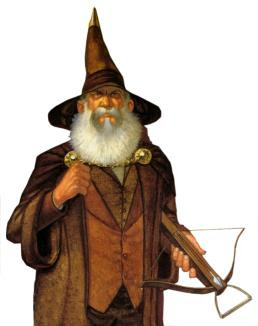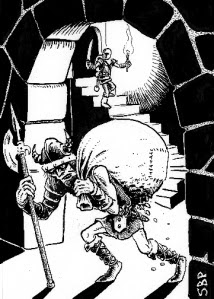18
August 2017 6:30 - 9:30 PM EDT
The
DM was Steve.
When
we last left our murderhobos, Gruffled the plucky halfling thief was down to
zero hit points. Yaspar, bother of Vuvier, had poofed away in a treasure room
right before the eyes of his charge, Thane the magic user.
I'm
skipping over some fighting and stuff from the last session because I didn't
find it to make for compelling recapitulation. But there were some hogoblins
and a gelatinous cube and some thouls expertly RPed by DM Steve.
The
rest of the PCs to my astonishment poked around in the place where Yaspar had
simply disappeared, and then decided to follow him! We all found
ourselves teleported into a room full of sarcophagi - and no exits! It
was a simple and deadly stone tomb!
So
with little other option, we started pushing the tops of the sarcophagi and to
our delight, many of them held rich treasures in coins of various kinds!
But to our dismay, we could not get them out again because, remember, no door.
So
we kept opening them until to our horror a Wight popped out of one and stole
two levels! One from Yaspar (making him a Level 0) and one from our magic user
Thane, who then lost his second-level spell Web, which could have helped.
He also took Yaspar down to -2 hit points and started to munch on him. So
our cleric, Raven, having failed four turn undead checks, doused the restless
dead with oil and threw a torch! But the oil had gotten on Yaspar as
well, and the two of them burned like so much crispy bacon in a frying pan.
Raven
then cast healing spells on Yaspar to get him up to 0 hits and on his feet, but
he was fried, he'd lost a finger, and half his face was eaten off. It was
awful! His brother Vuvier threw his wolf-pelt over his injured brother
and Yaspar thanked the gods for his "good" luck.
In
the process of opening the rest of the sarcophagi (remember, we are still
looking for an escape route), there was another Wight!! We had almost
been TPKed from the last one so Yaspar stood and threw his mysterious, magical
necklace at the thing. I didn't really know what it was but I guessed
right: it exploded into the most deadly 6d6 Fire Ball ever seen (27 Hit
Points). The Wight and cleric Raven were immediately disintegrated, and
everyone else besides Yaspar and Gruffled (both at this point outside the
radius) were between -1 and -10 hits.
OH
NO!! TOTAL PARTY KILL!?!?
First,
Yaspar grabbed the two potions of Climbing on his brother's dying body and
mixed them together. He fed them to Thane, our last magical character in
hopes Thane could help. It turns out, the postions mixed to make... a
double strength potion of Climbing. We had a corpse that could stick to
walls!
Then
the two little guys struggled together to push open sarcophagi. With some
great fortune, they found three potions of Healing and two other potions.
One into Thane, which was a potion of healing. He was up to 0 Hits.
The second into Vuvier, also a potion of healing! Up to 0 Hits!
Then the FIFTH into Ronin! But working blind they fed Ronin the Fighting
Corpse a potion of Levitation (floating dead guy) and a potion of Humanoid
Control (mind-controlling floating dead guy) and finally a potion of healing
*GREAT FORTUNE* WOOO! TPK avoided big time.
So
we had five characters with 0 hits between them and minus two levels. We
had the burnt corpse of a cleric. We had loads of treasure but no way to
get back to daylight. And we were very low on rations - just two days'
left. The Fire Ball had cooked most of our water and killed the six-legged
frog, Jane.
We
did however find the special magic item we were sent to get - an evil
book. A book, in fact, that zapped Vuvier back into a coma!
After
some fadiddling with the doodly-doo, we figured out how to get out. I
don't want to tell you more because it would spoil the tricks and traps in that
one awful room. As it turns out we found out how to get back in and out
safely and without anyone noticing us later, so we did all get very rich.
So
when Yaspar went into that room, he intended to come out RICH, marry a pretty
girl, have lots of babies, and start a gnome town. When he left he was a
hideous bacon-like husk in a wolf pelt without any levels. He decided to
dedicate his life to Raven's church and order in her honor. When the high
priestess (they're all girl priests) of Freya came, we paid her to Resurrect
Raven, awaken Vuvier and Restore Thane's lost level. Then we awarded XP
to everyone but Raven and Yaspar, and they all leveled up.
You
see, Raven decided to retire from adventuring, having been cooked to
death. She escorted 0-Level Yaspar back to their temple to begin his
training as a priestess of Freya! They'd never had a boy or a gnome
priest before, but they're gonna give it a shot.
Gruffled
decided to take it easy for a while. He may decide to come back to
adventure with us some day. He's not retired but he's going to take his
money and have a good time.
Lord
Clifton was a jerk. First he promised we could keep what we took out of
the dungeon, and then he demanded his share. So we hid our money from
him, bid him good day and fare thee well, and began to scheme about raising an
army and taking his castle away to use as our own when we got high enough
level!
Levels
Awarded:
Human
Fighting-Man Ronin (Ethan): Level 4
Gnome
Thief Vuvier (Julie): Level 3
Halfling
Thief Gruffled (Nate): Level 3
Human
Magic-User Thane (previously an NPC but now a PC played by Julie): stayed at 3
Yaspar
(Scott): Lost a level, 0-Level Normal Gnome, training to become a Lawful 1st
level Cleric of Freya a Fighting Man of Freya, since gnomes can't
be Clerics.
Raven
(Simone): Died, Resurrected, lost a level. Lawful 1st Level Cleric of
Freya.
Next
time, two or three new PCs will be joining us. Nate wants to play a Dwarf
Fighting Man. AJ will be joining as a player and we don't know who she
will play. Simone did not want to be a Cleric anymore (hence the
retirement of Raven to NPC status) and she might also play a fighter.




















